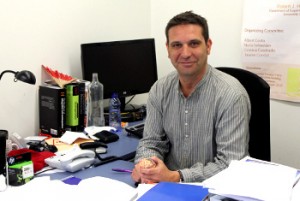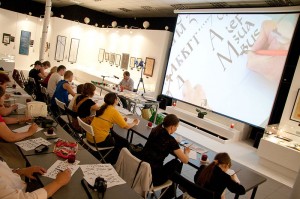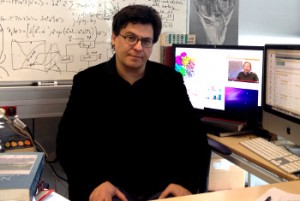The third series of ICREA-CCCB debates, «The Brain», continues on Tuesday 18th March with the lecture “The Bilingual Brain” by the ICREA research professor Albert Costa, one of the world’s leading scientists working in neurolinguistics. We have spoken with him and asked him to tell us in advance about some of the key areas of his research.

ICREA research professor Albert Costa
Your area of research is concerned with the way in which languages are installed in the brain in the case of bilingual speakers. Does this mean that you have identified the parts that store verbs and those that store nouns, for example?
One needs to think of the brain as being made up of circuits and not as isolated areas. By means of neuro-images we can tell which circuits are activated with speech. In the case of verbs and nouns, there are brain-damaged patients who are suddenly able to pronounce many more verbs than nouns, and other patients who start using more nouns than verbs. Hence, we see that there are some brain circuits that are more concerned with verbs and others with nouns. Starting from here, we look at bilingual speakers to see if the same circuits operate with the second language and the extent to which the organisation in the brain of the second language follows the same principles.
What should we understand by “bilingual speaker”?
Bilingualism doesn’t have a single definition as it consists of a wide range of cases. I lived in the United States for four years, for example, and I speak English with my son. Does that make me bilingual in English? Or aren’t I? Or, in the case of Catalan and Spanish, who is bilingual? The person who speaks both languages? Or only the one who speaks Catalan with his father and Spanish with his mother and must therefore have learned both languages at the same time? Every time we try to define bilingualism we leave out groups of people, so what we must do is to add adjectives to the concept of bilingualism: proficient bilingualism, of simultaneous acquisition, of successive acquisition, non-proficient, and so on.
What problems are entailed in being bilingual?
Bilingual people know fewer words in each language than monolingual people, for example. If you add up the total of all the words they know in both languages it will be greater, of course. However, a monolingual person might know 60,000 words in her language in contrast with the 40,000 a bilingual person knows in each of the two languages. If you play four hours of squash and four hours of tennis every day and I play only tennis for eight hours, I’ll play tennis better than you. Other disadvantages: it is more difficult for the bilingual person to find the precise word he needs. He experiences the “tip of the tongue” situation more often because he’s constantly changing languages, using them at ratios of 50:50 or 30:70 perhaps, while the monolingual person is 100% concentrated on just one language, so it’s not so difficult to come up with the more unusual words. Finally, there’s the matter of energy consumption. When you speak Catalan, you can’t switch off Spanish. You have to focus on one language and set aside the other. A monolingual person doesn’t have to do this. Bilingualism means devoting more resources and using more energy in this linguistic monitoring. It’s like when you go to England and you end up getting tired because of the effort of speaking English and your attempts to sideline Catalan and Spanish in order to speak English. Nevertheless, this outlay is only in terms of energy. It doesn’t use up neurones. In fact, quite the opposite happens.
What about the advantages of bilingualism?
Well we find that this linguistic obstacle course of managing two languages and switching the focus from one to the other is beneficial, and that it affects other brain structures and cognitive processes apart from language. We see that bilingual people can focus their attention better on stimuli, that they control attention better, have more grey matter and more neural connections in certain areas, and this means that they have a larger cognitive reserve when they are old. In bilingual people brain deterioration is slower. For example, we have seen studies showing that, among patients with Alzheimer’s disease, bilingual people come to the doctor complaining of symptoms later than monolingual people. This doesn’t mean they don’t have Alzheimer’s. In fact they show the same brain damage but they have compensatory strategies as a result of the obstacle course they’ve been managing for sixty years.
What are the practical applications of all these studies?
A better understanding of cortical representation of language can help us with a lot of things, for example, to decide whether to operate on a person or not. In the case of brain tumours we can know how the patient will end up, whether he or she will lose language or not. Or in bilingual patients who’ve had a stroke, we need to think about which language we should use for the rehabilitation. The one that’s least affected? Or the one that’s more affected? Or the one that’s more useful? These studies also help in language learning, to the extent that we can discover which techniques are best for language acquisition, or what predisposition each person has for languages. With small children we can find out which ones are more sensitive to phonological contrasts, and hence which children have more ability in learning languages, and so on.
Here’s another question people must always ask you: is it true that the earlier you start to learn a language the better?
The cliché says the earlier you start the better but this depends on certain other things. We know that sounds and accents should be learned very early. It is true that there is variation among individuals and that some people are good at capturing accents well but, in general, accent is picked up in the first year of life. Syntax should also be learned young but acquiring new words, for example, has no age limit. You can do this all your life. You’re learning new words in Catalan every day. This issue is always the cause of great controversy because, in Catalonia, we want the children to learn English, and the earlier the better, but we give them native speakers in the more advanced classes while the small children get non-native speakers! We need to give children teachers who are native speakers from the very beginning. This question always stirs people up and, every time I talk about it, I get complaints in emails from primary school teachers.
In Spain, your research has always been highly politicised.
It certainly has. When the Catalan radio stations phone me I know they want me to talk about the advantages of bilingualism and, in Madrid, they always ask me about the disadvantages … But, besides what goes on in the brain, bilingualism is a social decision. We decide whether to be bilingual or not, independently of what happens in the brain.
In the world in general bilingualism is the norm and monolingualism the exception.
Yes, monolingualism isn’t so common. In Europe it is relatively uncommon. Most European citizens speak more than one language. Another matter is whether you’ve been bilingual from the cradle. This isn’t so common, but there are a great many contacts between languages and this happens all around the world.










